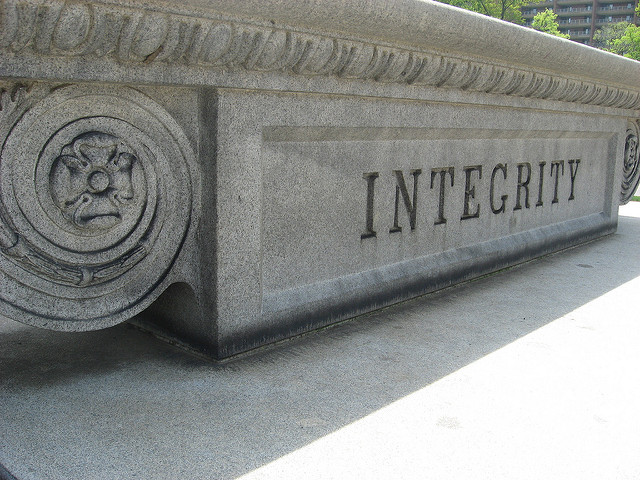The UK needs to put an approach to public ethics and integrity on a permanent, professional and evidenced basis
Are other approaches to public integrity needed? Alan Doig suggests in his final blog on the subject of standards in public life that it is important to re-think how we sustain public integrity in order to ensure we get policy in this crucial area right.
After reading my previous blogs it would be fair to say that readers might elicit four issues I have with the Committee for Standards in Public Life.
Could my general view be that the work for which the Committee on Standards in Public Life was set up to do is substantially completed but that there remains a continuing need to monitor the ethical environment? Wrong; that was a summary of some of the views of The Quinquennial Review of the Committee on Standards in Public Life published in 2001.
Did I say the Committee should be more strategic, reviewing systems and having an oversight role? Again not my views; this time it was the 2012 Triennial Review of the Committee on Standards in Public Life.
How about suggesting that the primary purpose of the ethical regulatory system is to ensure that standards of public conduct remain high, rather than to seek to promote trust in public life as a whole? Wrong again; that was the perspective of the Public Administration Select Committee (PASC) in 2007.
Finally is there an assumption that what I would be looking for is a body that could look across the landscape of public life to identify ethical problems as well as best practice in preventing poor ethical behaviour, set ethical standards and provide an ethical reference point for public office holders, draw together and disseminate expertise from across the sector and maintain a broad and detailed knowledge and understanding of ethical regulation in the UK as well as working with others to produce evidence-based and practical recommendations for change? Apologies again; this is the Committee itself in its response to the Triennial Review.
So, what does this tell us? Well, there is a trail of comments in the past 10 to 15 years that suggest that the concept of the Committee, having served in its earlier iterations a useful purpose in establishing an ethics agenda and eliciting institutional and procedural reform, no longer has the visibility and credibility necessary to lead on future approaches.
It lacks a clear strategy (and it certainly doesn’t understand the differences and synergies between compliance frameworks and ethical organisational cultures). It does not understand the roles of priority, sequencing and timing in developing and embedding reform. It has no substantive scrutiny, monitoring and oversight powers. It has no authority or means to stop governments tampering with institutions and roles. It has been unable to change those reforms proposed by earlier iterations of the Committee that are not working effectively or not working collectively. It is not seen as primus inter pares among others who have ethics and preventative roles and responsibilities and it does not integrate its work with related agendas on fraud and corruption. It does not even live up to its own image of itself as presented to the Triennial Review.
The next steps are important, including stopping this government marginalising the Committee just because they and some of its critics don’t like it. And here it’s worth bearing in mind that the government has cut the Committee’s budgets, using that to reduce the work it has done (such as surveys and focus groups) and no doubt discouraging it ever getting outside London to find out how different public life can be elsewhere in the United Kingdom. Government has ‘advised’ the Committee what to do (and what not to do) even though it doesn’t pay much attention to what it still says. At the same time it has used some of the language used to cull other bodies (in the case of the National Fraud Authority that its work was largely done and in the case of the Standards Board that it should become strategic). To re-phrase its own comments on the abolition of the latter and the Audit Commission, to discard the Committee without proposing an alternative would strip back the current arrangements, leave a big gap and raise concerns about the ‘inherent robustness’ of what (if anything) is left. It is important that somewhere there should be a debate on what is actually needed to take forward the public integrity agenda but we can do with less advice and a more substantive focus on implementation, monitoring and scrutiny.
I have argued that we don’t know if the overall compliance framework is in place – as in local government – but we do know that, as in the case of the Legislature, that not everything is as effective as it should be. We know, as the Commissioner for Public Appointments has warned, that governments are capable of sidelining independent assurance e in favour of ministerial primacy or, as the Public Administration Select Committee reported in relation to post-resignation and post-retirement business appointments, ignoring parliamentary and other concerns over existing institutional and procedural inadequacies if it is expedient so to do. And we do need a means of getting what’s in place working effectively rather than rush off into new areas and issues without bedding down or checking up on existing arrangements.
In other words we need a body or bodies to assess whether is the compliance framework is fit-for-purpose and is it functioning effectively, both of which require a hands-on monitoring role and an authority to intervene or insist on improvement. We need a body or bodies to take the lead on the illusive (sometimes illusory) ethical organisational culture – how it is delivered, assessed and supported. We do need an institution or institutions robust enough to coordinate those existing appointments and bodies with a partial or substantial role in public integrity and intervene where existing arrangements are inadequate.
Such a body or bodies needs to provide strategy, framework, coordination and scrutiny; it may have to intervene and it may need the statutory or other authority so to do. It certainly has to stand up to government; it has to have credibility not only among existing appointments and bodies but also with other related agencies, including the police, and with the public and opinion-makers. It may require, as the Public Administration Select Committee has acknowledged, the possibility of a legal framework and reporting to Parliament rather than government, having its views and proposals, as well as those of the organisations subject to its reports, debated publicly.
What is now needed is a debate on what institutional configuration, what types of expertise and what level of capacity should replace the Committee, and it may not necessarily be a single agency.
It may be an institution to deal with the Executive along the lines of the Standards Commission proposed by the Select Committee or similar to the Canadian model (or, more robustly, the US Office of Government Ethics) to encompass MPs and ministers’ interests, senior public officials’ interests, ministerial public appointments, and post-resignation and post-retirement business appointments.
It could also require, to return finally to the first blog, a separate institution reflecting the French and/or Dutch approach that deals with the public sector, including the NHS and local government. While the former is limited with an emphasis on corruption, it also encompasses a preventative and training/awareness roles. The latter is a systematic attempt to do all the things the Committee wants to be but hasn’t delivered for the reasons discussed in the previous blogs. The National Integrity Office provides advice and guidance; it liaises with those responsible for implementation of integrity; it develops and shares knowledge (it has a support centre for integrity investigations of holders of political office to help those tasked with dealing with breaches). Further it, crucially, not only provides an integrity management system that devotes explicit attention to the coordination and institutionalisation of integrity (and the approach recognises the integration and management of the compliance framework and ethical institutional cultures) but it also allows for institutionalised monitoring and evaluation.
Now much of this relies on a statutory framework and on the cooperation and engagement of government ministries, local government, and so on. On the other hand it need not be expensive, nor over-staffed (the Dutch National Integrity Office has 8 employees). The point to be made here is that we should not by default think the Committee is the only approach available because we are concerned about cost, flexibility or roles and responsibilities, and nor should we avoid the debate on any assumption that what we have in place is either the only or most effective way of delivering public integrity.
In the month the UK government hold a summit on corruption it should not be beyond its capacity – or that of the UK Legislature (or PASC) – to replicate the initiative of their Dutch colleagues whose Presidency of the European Union prompted, to use its own words, ‘various reports as part of an ongoing international dialogue on strengthening the public administration and developing evidence based integrity and anti-corruption policies’ by doing the same for the UK. We need to put our approach to public ethics and integrity on a permanent, professional and evidenced basis for the foreseeable future, and we need to think through the how, now.
I could summarise this by arguing that we need to oversee the framework of internal systems and monitor compliance as much as we need to monitor awareness of standards and take remedial action where necessary. I could also claim that these are my words with which to close, but they are not; they are from the First Report of the Committee on Standards in Public Life from 1995. Their resonance and relevance today suggests that we need to re-think how we embed and sustain public integrity and which institutional and procedural approaches are the most appropriate, proportionate and effective for achieving this.
—
Note: this post represents the views of the author and not those of Democratic Audit or the LSE. Please read our comments policy before posting.
—
 Alan Doig is a Visiting Professor, Newcastle Business School, Northumbria University and Board member, Management Board, North-east Fraud Forum.
Alan Doig is a Visiting Professor, Newcastle Business School, Northumbria University and Board member, Management Board, North-east Fraud Forum.






 Democratic Audit's core funding is provided by the Joseph Rowntree Charitable Trust. Additional funding is provided by the London School of Economics.
Democratic Audit's core funding is provided by the Joseph Rowntree Charitable Trust. Additional funding is provided by the London School of Economics.
The UK needs to put an approach to public ethics and integrity on a permanent, professional and evidenced basis https://t.co/b3faj5QUsT
The UK needs to put an approach to public ethics and integrity on a permanent, professional and evidenced basis https://t.co/sV26sMfmiJ
The UK needs to put an approach to public ethics and integrity on a permanent, professional and evidenced basis https://t.co/jtNdRjRTix
The UK needs to put an approach to public ethics and integrity on a permanent, professional and evidenced basis https://t.co/SdS93kWxKO
The UK needs an approach to public #ethics & #integrity on a permanent, professional & evidenced basis https://t.co/gPESFoewt0 #governance
Maintenance of standards in public life requires institutional underpinning. Alan Doig reflects on the UK approach: https://t.co/Aafc21n7Sz
The UK needs to put an approach to public ethics and integrity on a permanent, professional and evidenced basis https://t.co/iGUlHUeeHc
The UK needs to put an approach to public ethics and integrity on a permanent, professional… https://t.co/NOjnp7StLW https://t.co/Sut3afLz2u